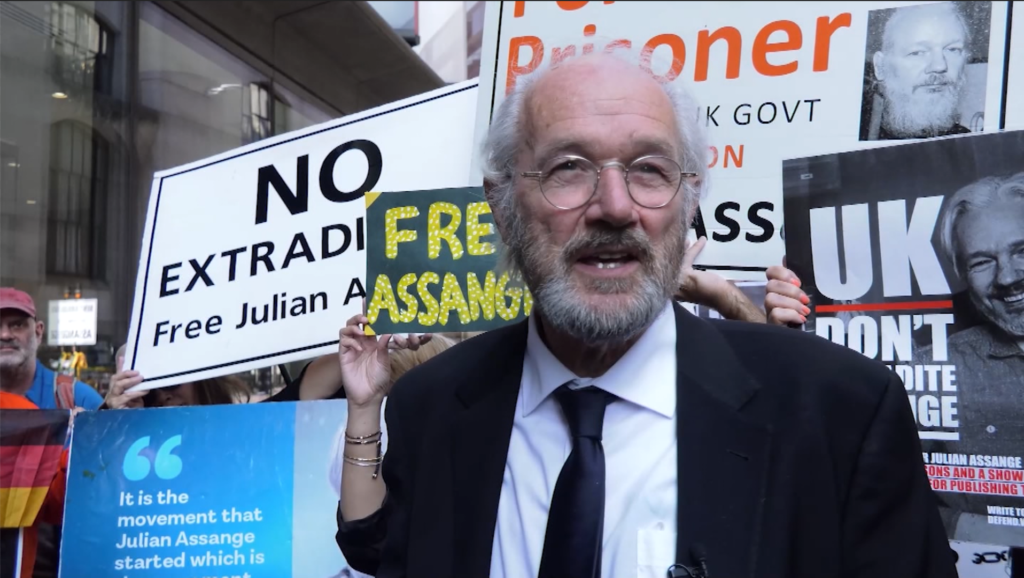
- See previous daily reports here and a video recap of last week’s proceedings here
- See an overview of USA v. Julian Assange here
- See a thread of live-tweets of today’s hearing here
Warning: this post discusses suicidal ideation. As mentioned yesterday, for Assange’s privacy we won’t report every detail of today’s testimony, dealing with Assange’s very personal private, social, and medical history.
Prosecution attacks Assange’s autism spectrum diagnosis

Today Dr. Quinton Deeley, National Health Service psychiatrist who specializes in autism, ADHD, & other mental health issues, took the stand to discuss Julian Assange’s diagnosis of Asperger’s syndrome, an autism spectrum disorder (ASD). Dr. Deeley interviewed Assange several times over a period of several months, and he spoke to Assange’s partner, mother, and friends to corroborate his findings and prepare a report. Dr. Deeley also agreed with what Dr. Kopelman testified to yesterday, that Assange would be a “high risk” of suicide if he were ordered to be extradited.
Dr. Deeley explained that Assange had taken two ADOS tests leading to his diagnosis, and he observed “obsessive rumination” and “rigidity of thought”, typical ASD symptoms. In brief defense questioning, Dr. Deeley also spoke about the high rate of suicides in solitary confinement and the dangers of isolating Assange in both UK and US prisons.
The prosecution then spent nearly its entire cross-examination questioning this diagnosis, attacking Dr. Deeley’s findings and impartiality.
Prosecutor James Lewis suggested that the fact that Assange has hosted a televised interview show, written books and articles, and given speeches indicate his sociability and contradict the diagnosis of Asperger’s. Lewis even played a video of Assange speaking at the Frontline Club in 2010 by Skype, answering questions about WikiLeaks’ releases, redacting to protect informants, and partnering with fellow media organizations.
Dr. Deeley rejected the idea that these activities contradict a diagnosis at all. On the contrary, they show Assange in his comfort zone, he said, speaking at length on issues of which he has substantial interest and knowledge in a well-defined setting. In these interviews and Q&A sessions, Assange is an “expert on the material” and knows the expectations of format, so he doesn’t have to pay attention to social etiquette or make small talk.
Lewis said the fact that Assange has sole custody of a child was “inconsistent” with the diagnosis, suggesting that “no court” would give custody to someone who had “difficulty developing peer relationships.” He also said that those on the autism spectrum “lack empathy,” and his mother described him as an “extraordinarily selfless father”, suggesting these are “inconsistent” as well.
Dr. Deeley rejected this idea too, saying that those on the autism spectrum can be parents, and it isn’t unusual for them to be “dutiful, principled,” and moved by the idea of suffering in general.
Lewis questioned Dr. Deeley’s impartiality, asking if he was trying to “excuse” behavior or confirm a diagnosis. Dr. Deeley said he was giving a comprehensive summary, and that trying to drill down on one item of supportive evidence for the diagnosis misses the full picture. Lewis said that Dr. Deeley himself often looked at the ceiling when giving answers in court, rather than making eye contact, insinuating that eye contact isn’t relevant to a diagnosis and even saying “we all do that.” Dr. Deeley seemed taken aback, saying that he didn’t think he would score highly on an ADOS test (meaning he wouldn’t be found on the autism spectrum), that he was presenting to the defense, the judge, the prosecution; eye contact alone isn’t a definitive indicator.
On final defense re-examination, Dr. Deeley confirmed his corroboration of the diagnosis. “It is clear to my mind that Julian Assange is on the autistic spectrum,” he said.
Prosecution’s first witness, Seena Fazel
The prosecution called its first witness this afternoon, as scheduling issues disrupted the defense witness list which will continue tomorrow. The prosecution called Seena Fazel, Professor of Forensic Psychiatry at the University of Oxford, who specializes in prison suicide. Fazel interviewed Assange this summer, notably after what doctors agree was his most severe period of depression at the end of 2019.
Fazel testified that he found Assange to be “moderately depressed,” but accepts that he was “severely depressed” in late 2019 and was treated with medication, and that Assange’s depression intensity is “episodic” and liable to fluctuate dependent on his circumstances. However, he said, he doesn’t find Assange’s mental capacity such that he is unable to manage his own suicidal risk.
Fazel agreed that Assange has “autistic-like traits” but that he would be in the milder end of the autism spectrum.
In defense cross-examination, Fazel conceded that he is not an expert in U.S. prisons, which have a 6-7 times larger inmate population. This means, the defense established, that he’s not aware of Alexandria Detention Center where Assange would be held in pre-trial confinement nor the full effect of Special Administrative Measures (SAMs), to which Assange would be subjected, nor is he aware of ADX Florence in Colorado, where Assange is likely to be sent post-trial if convicted, and where conditions under SAMs have been described by a former warden there as a “clean version of hell” and “unfit for human habitation.” U.S. prison experts will be called to testify about those facilities, likely later this week.
Discussing solitary confinement and lengthy prison sentences, Fazel said that “hopelessness is an important risk factor” for suicide, that Assange’s risk increases if he feels he has “bleak prospects.”
Prosecution questioning attempted to undermine the definition of solitary confinement and to paint a rosier view of Supermax imprisonment, as prosecutor James Lewis read off a long list of amenities allegedly offered at the federal facility in Colorado, such as “13-inch televisions” and “arts and crafts.” The defense noted that this description does not apply to housing unit H, where Assange would be held.
